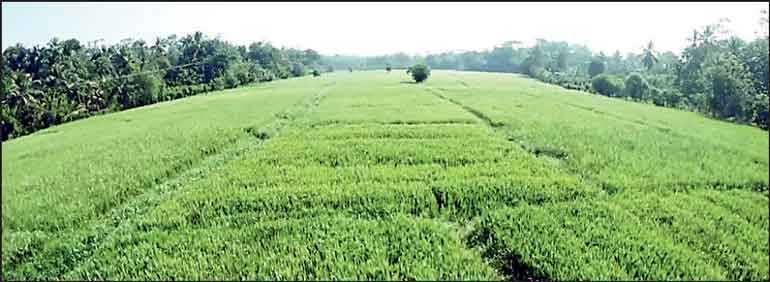Wednesday Feb 18, 2026
Wednesday Feb 18, 2026
Saturday, 15 February 2020 00:04 - - {{hitsCtrl.values.hits}}

Nearly Rs. 3,830 million will be released through Bank of Ceylon, People’s Bank and Regional Development Bank for the implementation of the Government’s paddy purchasing program for the Maha season 2019/2020, which has been initiated to provide a reasonable price to paddy farmers for their produce.
Cabinet this week agreed to a proposal by Prime Minister Mahinda Rajapaksa, who is also Minister of Finance, Economic and Policy Development, to provide funds through the banks for the continuation of this program which began last month. A harvest of about three million metric tons of paddy is expected from this year’s Maha season.
The Government decided to intervene in the purchase of the excess stocks of paddy during the current harvest season with a view to stabilising the price of paddy and compelling rice mill owners in the private sector to purchase paddy at a reasonable price.
Under the program, paddy will be purchased at a minimum guaranteed price of Rs. 45-50 for a standardised kilogram of paddy, the Rs. 5 price change subject to the criterion of moisture content in the paddy. The program is monitored by Divisional Secretaries and District Secretaries and the Paddy Marketing Board (PMB).
Cabinet this week also approved a proposal submitted by the Minister of Mahaweli, Agriculture, Irrigation and Rural Development Chamal Rajapaksa to take measures to maintain a buffer stock of 20,000 metric tons of rice comprising Samba and Naadu varieties by obtaining the stocks of paddy purchased by the PMB.
Cabinet spokesman Minister Bandula Gunawardena said that there is a hike in rice prices during the months of November and December every year as adequate stocks are not maintained. The extra stocks will be used to maintain a fixed price on rice in the market by releasing them via Sathosa at a Government-certified price whenever the price increases, said Gunawardena.
Cabinet also gave approval this week to a related proposal for implementing a program to be undertaken with the International Rice Research Institute to breed new categories of paddy that are resistant to weather changes, diseases and parasites.
The Rice Research and Development Institute, operating under the Department of Agriculture, engages in paddy research activities to breed new categories of paddy to be cultivated within Sri Lanka at their relevant research centres, and works with the International Rice Research Institute in Philippines which provides instructions, guidance, gene technology and other related knowhow.